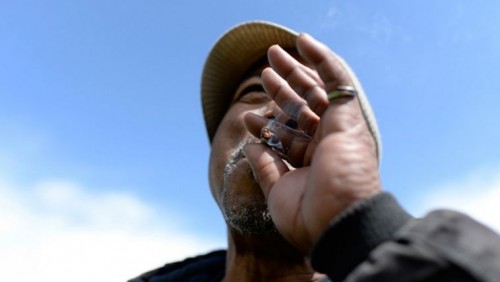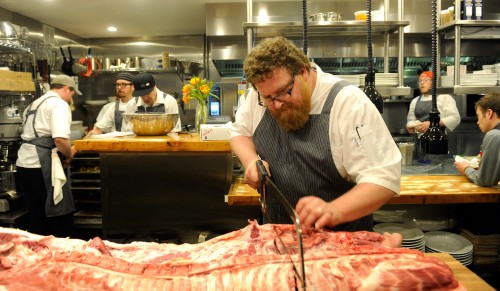The proposed initiative that would allow Denver entrepreneurs to open their 21-and-up business and patio spaces to limited marijuana consumption has divided many in the city – and it’s not even clear yet if the question will land on the city’s November 2015 ballot.
While a new poll commissioned by the activists behind the measure shows voters supporting the initiative, many of the businesses that would decide to either allow cannabis consumption, or not, are vehemently against the proposal.
More views on social pot use
The initial proposal: Allow more places for pot use in Denver
Editorial: Vaping in bars, smoking on rooftops? Public pot plan goes too far
Pot law expert: Colorado needs spaces for public consumption of marijuana
Looking to the future: Colorado lawmaker predicts ‘we will see cannabis clubs similar to bars’
NEW: Get podcasts of The Cannabist Show.
Subscribe to our newsletter here.
Watch The Cannabist Show.
“We will be adamantly opposed to it,” said Sonia Riggs, CEO of the Colorado Restaurant Association, an industry group that works with 4,500 businesses, or about half of the state’s restaurants.
“My company is against it,” said Leigh Jones, co-owner of Denver bars the Horseshoe Lounge, the Bar Car, Inga’s Alpine Lounge and the new Nip & Sip Neighborhood Lounge.
“I would be against it,” said Noel Hickey, owner of the Celtic Tavern and Delaney’s Cigar Bar in LoDo, “and I wouldn’t allow it in any of my bars.”
“I would think anyone who owns a nightclub or bar that sells alcohol would be against this,” said longtime Colorado hospitality professional Lannie Garrett, owner of Lannie’s Clocktower Cabaret.
Not everyone running bars, art galleries, restaurants and other venues in Denver are against the measure. Some support it but wouldn’t allow social use on their property. Others said they’ll vote yes for consumption in these spaces and will figure out a way to allow it in their business. Some are flat-out flummoxed.
The entrepreneurs contacted for this story all have strong feelings on the matter, and there’s plenty of shared ground among their praise and concerns. But one of the initiative’s authors says many of their concerns are unfounded because, if the measure passes, the business owners could opt against pot use on their premises.

“The law allows establishments to choose if they want to allow it or not,” said the Marijuana Policy Project’s Mason Tvert, who with Colorado attorney Brian Vicente started the Denver Campaign for Limited Social Cannabis Use. “They don’t have to allow it, so it’s a silly argument.”
Tvert and Vicente, the primary authors of Colorado’s pot-legalizing Amendment 64 approved by voters in 2012, are proposing a social use measure that is more liberal than the cannabis-only clubs that have been briefly discussed by some Colorado politicians. If the measure passes, it will look like this, they say:
With the business owners’ permission, customers at bars, art galleries, restaurants, movie theaters and other businesses would be allowed to eat pot-infused edibles or vaporize inside those commercial establishments’ 21-and-older areas and smoke pot in their age-restricted outdoor areas where tobacco use is permitted, like rooftop patios, that are at least 25 feet from public spaces such as streets and sidewalks. Outdoor pot smoking would need to be shielded from public view, and no cannabis would be sold at these businesses — that would remain at licensed pot shops only.
Where to smoke in Denver
Denver pot tourism guide: Useful info for toking travelers
Visiting Denver: Is this central Denver’s first 420-friendly hotel?
Watch The Cannabist Show. Follow The Cannabist on Twitter and Facebook
Ingesting marijuana in any form is currently illegal in most places outside of private residences in Denver, where multiple cannabis clubs have been shuttered by police. Other municipalities, including Colorado Springs, Nederland and unincorporated Adams County, are experimenting with cannabis clubs.
The activists are currently gathering the needed signatures to get the consumption question on the November 2015 ballot. While most business groups and entities have yet to develop a position on the initiative — including the city of Denver, the tourism group Visit Denver, the Downtown Denver Partnership and the Colorado Hotel and Lodging Association — some hospitality industry vets are in the activists’ corner.
“As a business owner you should be able to do whatever you want to behind your walls,” said Justin Brunson, chef-owner at Old Major, Masterpiece Deli and the soon-to-open Honor Society. “We pay a lot of taxes to be in business, and if we wanted to allow something that is legal within our four walls, we should be able to do what we want to.”

Brunson said he wouldn’t allow vaping inside his restaurants, but he’s more interested in the private parties that would be possible should the initiative pass.
Hapa Sushi and Motomaki owner Mark Van Grack similarly supports the initiative but said his restaurants aren’t the right space for consumption of any kind.
“There’s definitely a need for public consumption of some kind. … Weed needs to be, and eventually will be, treated as alcohol from a standpoint of sale and consumption,” said Van Grack. “We would not consider it for our current operations, but if the time was right where we could do a concept around edibles then we may consider it.”
Chef Tom Coohill of LoDo fine-dining outpost Coohills is all about the measure and would welcome the consumption of cannabis-infused edibles (but no vaping, given its subtle odor) in his dining room.
“I don’t think pot is a very aggressive drug,” said Coohill. “It’s less aggressive than alcohol. I don’t see why it shouldn’t be allowed. Who cares if someone does an edible in a restaurant? To me, eating an edible is the same thing as drinking a beer. It’s just like drinking. It’s not any different.
“I don’t think that’s a big issue. I would support it.”
Entrepreneur Wanda James owns Jezebel’s Southern Bistro and Bar in LoHi — and she’s also president of the pro-legalization Cannabis Global Initiative and owner of yet-to-be-opened pot shop Simply Pure. She and her husband/business partner Scott Durrah support the consumption initiative and would incorporate it into their business model at Jezebel’s, she said.
“People were terrified and paranoid about Amendment 64 passing,” said James. “Well, look what happened? The unspeakable happened: We have more college kids coming here and are drawing more conventions and businesses who want to be here in Denver. … We’re setting tourism records and, despite what Visit Denver says, everyone knows what caused the spike in tourism in 2014. Denver became hip, and it’s the tourists we want to see coming to Denver.
“But then they get here and they buy their legal cannabis and they have nowhere to go use it.”
Given legal cannabis’ momentum, many hotels and bars want to figure out how marijuana consumption could fit into their business models, according to Campbell Levy, Denver-based director of media relations at Turner Public Relations, which works with hospitality industry clients all over the world.
“Everybody’s got their ears to the ground, and they’re interested in the possibilities and what (social pot consumption) is going to look like,” said Levy, “but they’re more concerned about the liability. The liability is going to trump any decisions that get made in the hospitality industry.”
Colorado restaurant consultant John Imbergamo understands why cannabis consumption makes for such a complicated issue in the industry: “It adds a level of complexity to running a restaurant that is already complex enough. If you add the marijuana high to the alcohol high that’s already going on, you double down on potentially difficult behavior.”

The two most common reasons entrepreneurs gave for opposing the initiative or not wanting to allow it on their premises dealt with capitalism and liability.
“I try and sell beer and alcohol, and I’ve found that marijuana users generally sit there and munch on some fries and talk way too much,” said the Celtic Tavern’s Hickey, whose Delaney’s is one of the few Denver bars still licensed for indoor smoking under the Colorado Clean Indoor Air Act. “I don’t think (allowing pot consumption) would increase my business.”
Byron Vall, general manager at the downtown rock club Marquis Theater, said he’s not against the initiative but that he doesn’t see it working in his venue because of the possible liability of an unmonitored substance. Who would be responsible if a customer left the Marquis and got into an accident: The bar, even though its bartenders might have only sold the person a couple of drinks, or the individual who was ingesting their own marijuana at the venue?
“It’s obvious that people do consume marijuana regularly on the way in or outside,” said Vall. “It’s this unspoken thing that happens. But where would the liability stand if they’re getting high inside?”
Vall remembered a young female customer who had vomited on herself and had to be carried from the venue by her friends, who told his staff that she’d consumed too much of a Cheeba Chew, a popular and potent Tootsie Roll-like edible.
“When I closed out her tab, it only had a couple beers on it,” said Vall. “It doesn’t happen often, but the point is, especially in LoDo with all those high-volume bars, you can’t babysit every person in there. We all know people who can use marijuana and drink and have fun and be safe, but because of how now-widespread the reach is and people are traveling into town for this, you’re going to get a lot of inexperienced people trying this out, and it’s not always going to go as expected.”
